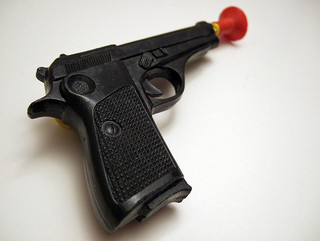
 There is some good news. In his latest TED talk, Bono says world poverty is on the decline. In his book The Better Angels of Our Nature, Steven Pinker says violence has been on the decline for centuries. You wouldn't know it by looking at what happened in Boston, though, and Sandy Hook, and throughout the rest of the world. So, I'd like to ask a simple question:
There is some good news. In his latest TED talk, Bono says world poverty is on the decline. In his book The Better Angels of Our Nature, Steven Pinker says violence has been on the decline for centuries. You wouldn't know it by looking at what happened in Boston, though, and Sandy Hook, and throughout the rest of the world. So, I'd like to ask a simple question:
I. Where does peace begin?
I admire the warriors who want gun laws changed, people like Gabrielle Giffords and New York Mayor Michael Bloomberg. I believe, eventually, they will triumph. But I don't think that's where peace begins.
II. Peace does not start with tragedy. It starts with happiness.
If you are a parent, start with your children. How can you tell them what peace is? Even better, how can you help them discover peace and non-violence for themselves? If you are a father, this assignment becomes critical, something you need to do now. Today.
III. Young men.
The bombing of the Boston Marathon is the work of young men. A young man shot down children and teachers at Sandy Hook Elementary School. There was a young man behind the weapon at the mass shooting at the movie theater in Aurora, Colorado. A young man shot former U.S. Rep. Gabrielle Giffords. I look for explanations, patterns. Their parents are educated, their parents are working stiffs, their parents are immigrants, their parents were good, their parents were bad.
Pattern? There's only one pattern. They are all young men. Of course, they had access to weapons and access to violent entertainment (movies, video games) on which to model their behavior. I want to take things back a few clicks, though, to when they were children. When did they first hold a toy gun? What did that feel like? What was it like for them to play-fight, to shoot at and innocently "kill" a friend in a game? If you've watched boys play, you see they know how to shoot, they make the sound of a bullet leaving the chamber, they spin down to the playground dirt with convincing violence. When does that start?
IV. When Your Kid Asks for a Toy Gun
Inevitably, parents will face this difficult moment. Your kid asks: "Dad can I have that?" The question sounds innocent enough. But when your kid is pointing to a toy gun it's -- pardon the pun -- a loaded question. What if you said this: "No, that's a gun, and we don't play with those." You'd get a lot of complaining, even crying and whining, but you'd also get a conversation with your kid. "Do you know what guns are used for? People use them to kill animals and to kill other people. That's just not something we want to play with. It's serious."
V. Rage
Your kid might get mad at you if you talk like that. But if we look at the examples above of young men who committed acts of gun violence, there is always rage involved. It might have been a quiet rage that nobody saw coming, it might have been madness. It certainly started with suppressed anger. It started with not talking about something. If rage comes up, it's useful, and you can try talking it through. If more young men had a forum for working through rage, there would be less violence expressed at the barrel of a gun or with a bomb. Yes, this is a tall order, a complicated fix, but you can start by talking to the first kids you see in the morning. Your own.
VI. When Your Kid asks for a Real Gun
There's an argument to be made for showing a young person how to shoot. If you are a hunter, this might be a tradition in your family. A healthy respect for the power of a firearm is a good thing.
VII. Fathers as Role Models
If you can handle a gun with dignity and respect for its power, it says a lot to your kid. When you go deeper, however, disturbing questions come to the surface about guns in the home and their violent purposes. Are you killing an animal because you are hungry and plan to eat it, or for sport, simply to watch it die? If you own guns at home, are you willing to tell your children that guns at home are likely to be used in suicides? (You probably won't; I doubt I would have the courage to say that.) When you feel rage, what do your kids see? When you say you need a gun for protection, what do your kids learn from that? When you say no to gun toys and violent play, do your kids understand why?
VIII. Changing the Conversation
These are certainties: Gun owners are not crazy. We will see changes in gun legislation to limit access to guns. Arguments in the political sphere about that legislation will go on for a long time. From person to person there will always be differences in our relationship to violence and peace. So if we want violence to decline, we have to begin a conversation with our children. There is a primal conversation we all must have. It's going to start with this moment: "Dad, can I have that?" Your child will be pointing to a gun.
Photo Credit: Joe Loong via Flickr Creative Commons License.